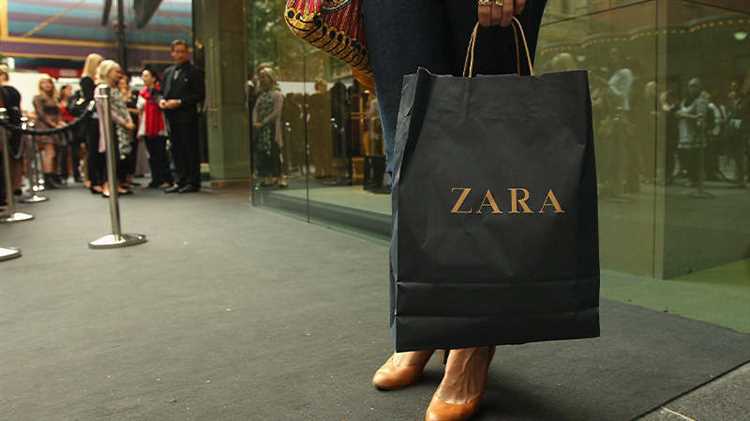
In recent years, there has been a growing concern about the impact of plastic waste on the environment. From single-use water bottles to shopping bags, the excessive use of plastic has led to pollution and ecological damage. In an effort to address this issue, many retailers, including fashion giant Zara, have started to charge customers for plastic bags.
By implementing this measure, Zara aims to encourage customers to bring their own reusable bags or opt for more sustainable alternatives. The decision to charge for bags serves as a reminder for shoppers to consider the environmental consequences of their choices. It also promotes a shift towards a more eco-conscious and responsible consumer behavior.
Furthermore, charging for bags can help Zara reduce its operating costs and improve its sustainability performance. By decreasing the usage of plastic bags, the company can save resources and mitigate the negative impact on the environment. This move aligns with Zara’s commitment to corporate social responsibility and its efforts to contribute to a more sustainable fashion industry.
Ultimately, Zara’s decision to charge for bags reflects the growing global awareness of the need to reduce plastic waste and protect the planet. By implementing this measure, Zara not only encourages customers to make more conscious choices, but also sets an example for other retailers to follow. It is a step towards a greener future and a testament to the brand’s dedication to environmental preservation.
- Sustainability initiatives
- Minimizing environmental impact
- Reducing plastic waste
- Environmental impact of plastic
- Promoting reusable bags and sustainability
- Encouraging reusable alternatives
- Reducing plastic waste
- Supporting the circular economy
- Promoting responsible consumption
- Educating customers about alternatives
- A multi-faceted approach
- Supporting social responsibility
- Q&A:
- Why did Zara start charging for bags?
- How much does Zara charge for bags?
- Will Zara still provide shopping bags for free?
- What impact does Zara’s decision to charge for bags have on the environment?
- Are other fashion retailers following Zara’s example?
- Why did Zara decide to charge for bags?
- How much does Zara charge for bags?
Sustainability initiatives
Zara has made the decision to charge for bags as part of its sustainability initiatives. The company aims to reduce waste and promote responsible consumption. By charging for bags, Zara encourages customers to bring their own reusable bags or opt for a more sustainable alternative.
This decision is aligned with Zara’s commitment to environmental sustainability. The fashion industry is known for its negative impact on the environment, and Zara is taking steps to mitigate this. By charging for bags, Zara reduces the amount of single-use plastic bags that end up in landfills or pollute our oceans.
Zara also aims to raise awareness among its customers about the importance of reducing waste and adopting sustainable practices. By making a small change in its bag policy, Zara hopes to inspire customers to think about their own consumption habits and make more conscious choices.
In addition to charging for bags, Zara has implemented other sustainability initiatives throughout its operations. The company has launched a clothing collection program where customers can donate their used garments. These garments are then either recycled into new products or donated to charitable organizations.
Zara is also committed to using more sustainable materials in its clothing production. The company has set targets to increase the use of organic and recycled fibers, as well as reduce the amount of water and chemicals used in the production process.
Overall, Zara’s decision to charge for bags is part of its larger sustainability efforts. By promoting responsible consumption, raising awareness, and implementing various initiatives, Zara is working towards a more sustainable future.
Minimizing environmental impact

Zara’s decision to charge for bags is aligned with the company’s commitment to minimizing its environmental impact. Plastic bags are known to have a significant negative impact on the environment, in terms of their production, use, and disposal. By implementing a small fee for bags, Zara aims to encourage customers to bring their own reusable bags or to limit their bag usage.
By reducing the demand for plastic bags, Zara can help decrease the amount of plastic waste that ends up in landfills or finds its way into ecosystems such as rivers and oceans. The fee also serves as a reminder for customers to be mindful of their consumption and make more conscious choices regarding packaging.
Zara has also taken steps to offer alternative bag options that are more sustainable. For example, the company now offers reusable bags made from recycled materials, which customers can purchase for a nominal fee. These bags are not only eco-friendly but also durable, ensuring that customers can use them repeatedly and avoid the need for single-use plastic bags.
Minimizing environmental impact is an ongoing goal for Zara, and the decision to charge for bags is just one of the many initiatives the company has implemented to achieve this. By encouraging customers to rethink their bag usage and offering sustainable alternatives, Zara aims to contribute to a greener, more sustainable future.
Reducing plastic waste
One of the key reasons behind Zara’s decision to charge for bags is to contribute to the reduction of plastic waste. The fashion industry is known for its significant environmental impact, particularly in the form of plastic pollution. By charging for bags, Zara aims to encourage customers to bring their own reusable bags or opt for sustainable alternatives.
Environmental impact of plastic
Plastic waste has become a major global concern due to its harmful effects on ecosystems and human health. Single-use plastic bags, in particular, pose a severe threat to the environment. They take hundreds of years to decompose and often end up in landfills or polluting oceans and other natural habitats. Marine animals, such as turtles and seabirds, mistake plastic bags for food, leading to significant damage to their digestive systems.
Promoting reusable bags and sustainability
Zara’s decision to charge for bags is part of its broader sustainability efforts. By making customers pay for bags, the company aims to shift consumer behavior towards utilizing reusable alternatives. This encourages customers to bring their own bags or invest in durable, reusable bags that can be used multiple times, reducing the overall demand and consumption of single-use plastic bags.
Furthermore, Zara can allocate the proceeds from bag sales towards environmental initiatives and investments in sustainable practices. This allows the company to actively contribute to the reduction of plastic waste and support the development of more eco-friendly solutions within the fashion industry.
Overall, Zara’s decision to charge for bags serves as a step towards reducing plastic waste and encouraging sustainable practices among its customers. By joining the fight against plastic pollution, Zara showcases its commitment to environmental responsibility and sets an example for other fashion brands to follow suit.
Encouraging reusable alternatives
In an effort to promote sustainability and reduce their environmental impact, Zara has decided to charge customers for bags as a way of encouraging them to use reusable alternatives. By implementing this policy, Zara aims to foster a culture of conscious consumption and reduce the amount of single-use plastic that ends up in landfills or polluting our oceans.
This decision is in line with the growing global movement towards more sustainable practices and the increasing awareness of the harmful effects of plastic waste on the environment. Many consumers are now actively seeking out reusable options such as tote bags, backpacks, or reusable shopping bags to carry their purchases.
Reducing plastic waste
By charging for bags, Zara hopes to incentivize customers to bring their own reusable bags when shopping, thereby reducing the demand for single-use plastic bags. This shift towards reusable alternatives not only helps in reducing plastic waste but also conserves resources and energy that would have been used in the production and disposal of these bags.
Supporting the circular economy
Zara’s decision to charge for bags also aligns with the principles of the circular economy, which aims to minimize waste and maximize the usage of resources. By encouraging customers to embrace reusable alternatives, Zara is promoting a more sustainable and responsible approach to consumption.
In summary, Zara’s decision to charge for bags not only aligns with the global shift towards more sustainable practices but also serves as a step towards encouraging customers to adopt reusable alternatives. By doing so, Zara aims to reduce the amount of plastic waste generated while promoting a more conscious and environmentally friendly shopping experience.
Promoting responsible consumption

Zara’s decision to charge for bags is motivated by their commitment to promoting responsible consumption practices. By charging customers for bags, Zara aims to reduce the use of single-use plastics and encourage shoppers to bring their own reusable bags.
This initiative aligns with Zara’s overarching sustainability goals, which include minimizing their environmental impact and fostering a culture of conscientious consumerism. Charging for bags serves as a tangible reminder to customers to be mindful of their consumption habits and make more sustainable choices.
Zara believes that by introducing this charge, they can contribute to the larger movement towards reducing plastic waste and raising awareness about the importance of responsible consumption. They hope that customers will recognize the value in using their own bags and see it as a small but significant step towards making a positive impact on the environment.
Educating customers about alternatives
In addition to charging for bags, Zara is committed to educating their customers about alternative options for carrying their purchases. Through signage in their stores and digital platforms, Zara provides information on the benefits of using reusable bags, such as durability, convenience, and their positive environmental impact.
Zara also collaborates with organizations and initiatives that focus on sustainable living and waste reduction. These partnerships allow them to share resources, knowledge, and best practices with their customers, further encouraging responsible consumption beyond simply charging for bags.
A multi-faceted approach
Zara’s decision to charge for bags is just one aspect of their multi-faceted approach to promoting responsible consumption. They are constantly evaluating and implementing new strategies to reduce waste throughout their supply chain, including energy-efficient practices in their production facilities and recycling programs for their products.
By taking a holistic approach to sustainability, Zara aims to inspire customers to adopt responsible consumption habits not only when it comes to bags but across all aspects of their daily lives. Through their actions, Zara hopes to become a catalyst for change in the fashion industry and show that responsible and sustainable practices can be both fashionable and accessible.
Supporting social responsibility

Zara’s decision to charge for bags is also a way for the company to support social responsibility. By charging for bags, Zara is encouraging customers to bring their own reusable bags when shopping. This small change can have a big impact on reducing plastic waste and minimizing the negative environmental effects associated with the production and disposal of single-use plastic bags.
Furthermore, Zara has announced that a portion of the proceeds from the bag sales will be donated to charitable organizations dedicated to environmental causes. This demonstrates Zara’s commitment to making a positive difference and supporting initiatives that benefit society and the planet.
By implementing this policy, Zara is encouraging its customers to be more conscious of their consumption habits and encouraging sustainable practices. It also sends a message to other companies in the fashion industry that they too can take steps to support social responsibility and make a positive impact on the environment.
| Benefits of supporting social responsibility: | |
|---|---|
| Reduces plastic waste | Zara’s decision to charge for bags encourages customers to use reusable bags instead of single-use plastic bags, reducing the amount of plastic waste that ends up in landfills and oceans. |
| Supports environmental causes | Zara is donating a portion of the bag sales to environmental charities, providing financial support to organizations dedicated to protecting the environment. |
| Encourages sustainable practices | By charging for bags, Zara is encouraging customers to be more conscious of their consumption habits and to adopt sustainable practices, such as using reusable bags. |
| Sets an example for other companies | Zara’s decision to charge for bags sends a message to other companies in the fashion industry that they too can take steps to support social responsibility and make a positive impact on the environment. |
Q&A:
Why did Zara start charging for bags?
There are several reasons behind Zara’s decision to start charging for bags. Firstly, the company aims to reduce environmental pollution by discouraging the use of disposable shopping bags. Secondly, by charging for bags, Zara can generate additional revenue. Lastly, it is also a strategic move to encourage customers to bring their own reusable bags.
How much does Zara charge for bags?
Zara charges a nominal fee of $0.50 for each bag. This amount is not significant, but it serves as a deterrent for customers to rely on disposable bags and encourages them to bring their own. The aim is to promote sustainability and minimize waste.
Will Zara still provide shopping bags for free?
No, Zara has completely eliminated the provision of free shopping bags. Customers are now required to purchase bags at a price of $0.50 per bag. This change is part of Zara’s sustainability initiative and its commitment to reducing single-use plastic waste.
What impact does Zara’s decision to charge for bags have on the environment?
Zara’s decision to charge for bags has a positive impact on the environment. By discouraging the use of disposable bags, the company aims to reduce plastic waste and environmental pollution. This move encourages customers to bring their own reusable bags, thereby promoting sustainability and responsible shopping practices.
Are other fashion retailers following Zara’s example?
Yes, Zara’s decision to charge for bags has influenced other fashion retailers to follow suit. Many retailers have started implementing similar measures to reduce plastic waste and promote sustainability. By charging for bags, they aim to discourage customers from relying on disposable bags and encourage them to adopt more eco-friendly shopping habits.
Why did Zara decide to charge for bags?
Zara decided to charge for bags as a way to reduce their environmental impact by discouraging the use of single-use bags. They are aiming to promote reusable bags and encourage customers to bring their own bags when shopping.
How much does Zara charge for bags?
Zara charges £0.10 for bags. This small fee is intended to cover the cost of producing and providing the bags while also encouraging customers to bring their own bags and reduce waste.